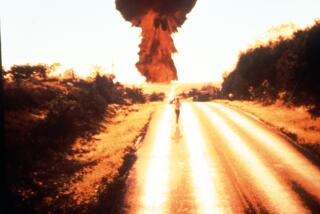Theater Trip Brings Back a Life’s Worth of Revelations
It has been a long time since a theatrical piece moved me as profoundly as South Coast Repertory’s production of “The Crucible.” I saw it Friday night, and I am still playing back in my head the period that prompted Arthur Miller to write it and that moved me--and, I suspect, much of my generation--as powerfully as it did him.
There are perhaps a half-dozen events in our lives that are pivotal, and one of those events in my life was certainly the Senate hearings that brought down Wisconsin’s Sen. Joseph McCarthy--and turned us away, finally, from a decade of witch-hunting that had its literal parallels in Salem, Mass., three centuries ago.
That is where Miller turned for the setting of “The Crucible,” a story based on documented history in which a group of frightened girls trying to cover up some sexual play blame their transgressions on a visitation of witches--whom they name under the prodding of a primitive, predatory minister and jurist. The fact that the women they accuse of witchcraft are pillars of the community who refuse to dignify the charges with a confession that will save their lives makes no difference to the self-righteous people prosecuting them.
When Joe McCarthy discovered in the early 1950s that by pulling a phony list of Communists in government out of his pocket he could break out of the obscurity to which his modest skills had confined him and could wield immense power, he too didn’t care about the lives that might be destroyed as a result of these reckless charges. And he destroyed a good many lives before he was finally brought to bay by his own associates.
When all this started to happen, I was almost totally apolitical. I had been raised in a conservative Midwestern family in which my parents canceled each other’s votes over a lifetime. Although my father was a small businessman, he was a Democrat who greatly admired Franklin D. Roosevelt. My mother was a firm Republican, and since she tended to be more outspoken about it and all of our friends and relatives were Republicans, I slid that way more by attrition than philosophical conviction.
I was involved in World War II when I turned 21, and I cast my first presidential vote for Thomas E. Dewey, in 1948, and my second one for Dwight D. Eisenhower four years later. We lived in a politically conservative suburb of Chicago, and I worked for a conservative trade association. I was just becoming aware of a growing restlessness with the political point of view I heard daily in my world when McCarthy began his broadsword attacks.
I heard my Republican friends and business associates express approval of McCarthy’s tactics, and I wanted to object but felt inadequate. It was a period when a handful of subversives had been found in government, and people were scared.
Since I had no idea whether these fears were justified, I started to read--a lot more deeply and broadly than I ever had before. I found balanced views out there that were rational and intrigued me, and I hungered for more. About the same time, I quit my job and started a career as a free-lance writer.
So when McCarthy--as do all men who feed on power and can finally never be satiated--reached too far in bringing charges against the U.S. Army and was hauled before a committee of his peers, I was working at home. And for three weeks, I simply couldn’t leave the television set.
There has never been a Western movie made in which the good guy-bad guy image was more clearly projected. The jowly, bombastic McCarthy and his oily legal assistant, Roy Cohn, made charges without evidence, destroyed lifelong reputations with lies and innuendo, and cloaked it all in the same patina of self-righteousness that drove the people who passed judgment in “The Crucible.”
And on the other side was the patient, dogged Joseph Welch representing the Army. One of the really critical moments of my life was when McCarthy, cornered, smeared one of Welch’s assistants and Welch excoriated him with such magnificent dignity that a whole country applauded. McCarthy never recovered from that moment.
Nor did I. Those hearings changed my politics. They taught me to read diverse points of view and form my own opinions and have factual information to defend those opinions. They taught me to believe nothing of substance I couldn’t prove to my own satisfaction. They taught me to spot demagoguery and to detest it. They taught me to suspect people who sit in judgment of others from Olympian places of self-righteousness. They taught me that the good guys don’t always win; that sometimes the bad guys smash a lot of good guys before they are brought to heel--if they ever are. And they taught me that a lot of people live scared--and to have compassion for them.
A lot of mean-mindedness is going on in this presidential campaign that stirs some memories of the McCarthy period. I hope and pray it doesn’t indicate a more pronounced turn back in that direction than we are already experiencing.
More to Read
The biggest entertainment stories
Get our big stories about Hollywood, film, television, music, arts, culture and more right in your inbox as soon as they publish.
You may occasionally receive promotional content from the Los Angeles Times.










